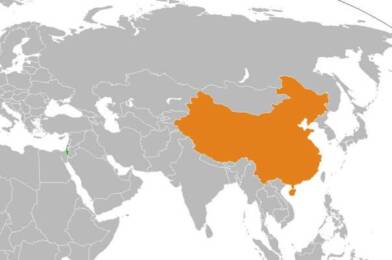
Tel Aviv. Future relations between China and Israel will be determined by the relations between Washington and Beijing that the new US administration will define.
In recent years China tried to perform some big projects in Israel. US pressure caused the negotiations to end up with nothing.
The question is now how can Israel navigate its relations with China without totally harming the commercial relations.
On December 3 last year, John Ratcliffe, the US Director of National Intelligence (DNI), published an article under the headline “China is National Security Threat No. 1,” in which he defined Beijing as the “greatest threat to America today, and the greatest threat to democracy and freedom world-wide since World War II.”
Ratcliffe compared resistance to the Chinese threat to the defeat of fascism and the fall of the Iron Curtain. According to the DNI, intelligence shows that China seeks “to dominate the US and the rest of the planet economically, militarily and technologically.” Many of China’s major public initiatives and prominent companies, he wrote, “Offer only a layer of camouflage to the activities of the Chinese Communist Party.”
According to Ratcliffe, China uses its economic espionage to rob American companies of their intellectual property, replicate their technologies, and replace them in the global marketplace, thus causing severe harm to the value of these companies and employment. China has a program to reward senior foreign scientists for stealing information on its behalf, and the FBI frequently arrests Chinese citizens for stealing research and development secrets.
The US administration estimates that Chinese theft of intellectual property costs the United States as much as $500 billion annually. China steals defense technologies in order to become a leading military power, and its intelligence services use technology companies such as Huawei and others to serve their purposes. US allies have been warned that using Chinese technologies will limit Washington’s ability to share intelligence with them.
What is the relevance of this article to Israel? According to Assaf Orion, a senior researcher in the Israeli institute for national security studies (INSS), the concerns raised are not new, and have previously been outlined at length in the US and around the world. Should Israel see China as a primary threat to its national security? It is important for Israel to read the text in depth as well as between the lines, and to identify the main challenges it faces from China, noting the similarities and differences from the challenges to the US.
“The Chinese military is not a threat to Israel, although Israel is affected by Chinese arms exports to the region. Ideological considerations rarely play a central role in Israeli foreign policy, which is pragmatic in its essence. More general, this is not the first issue in which the interests of Israel and its great ally don’t fully overlap. That’s the way it is with friends.”
Orion says in his paper released by INSS that the rivalry with China will without a doubt continue during and well beyond the Biden presidency, while at the same time the US will continue its extensive economic ties with China.
He adds that Jerusalem cannot remain indifferent to the question of America’s decline and certainly not to the intentional weakening of the US, whose power and support constitute a cornerstone of Israel’s national security.
“Israel conducts itself vis-à-vis China within the boundaries drawn by the United States, and from the early 2000s its defense exports to China were halted, at the request of Washington. When the US perception of national security changes and China is defined as the number one threat, the boundaries of what is permissible for Israel in its relations with China also change, and “business as usual” cannot be expected.”
Israel sees China as an important trading partner, and rightly so. China’s capital, its markets, its manufacturing capacity, and its infrastructure building capabilities are a significant contribution to the Israeli economy, and these Chinese assets are expected to grow. Over the past decade Israel has successfully identified this potential as an opportunity and has acted to maximize it, but Israel tends to identify the risk element of its relations with China mostly with the US response to these relations.
The shift of the American intelligence community’s focus and resources to China came after decades in which it was focused on other rivals. Naturally, Israel’s intelligence community is focused on security threats against Israel, most of which are in the West Asia, chief among them Iran. The large geographical distance and the linguistic and cultural differences with China complicate the challenge of what are already limited resources allocated to this topic.
“China is not the number one threat to Israel, and it is essential that it does not become so. It is also important to continue to benefit from the growing economic advantages of the relations, but responsible risk management is required. The lessons drawn in the US are a warning light for the unique challenges and risks inherent in relations with China, to which Israel too is exposed, and they must not be ignored. In view of the differences between them, Israel should not draw directly from the experiences and policies of the US, but should rather formulate its independent policies in line with its own singular characteristics and needs.”
Finally, the Israeli researcher says, it is likewise important to listen to the voices coming out of Washington. When the US identifies China as its number one threat, Israel’s maneuvering space in its relations with China can be expected to narrow,” while American sensitivity to these relations will skyrocket. Israel must not only steer clear of any harm to the vital interests of its strategic ally, but it should pay great attention to the mood in Washington, as befits relations with a close and loyal friend in a sensitive period.”
-The writer is an Israel-based freelance journalist








